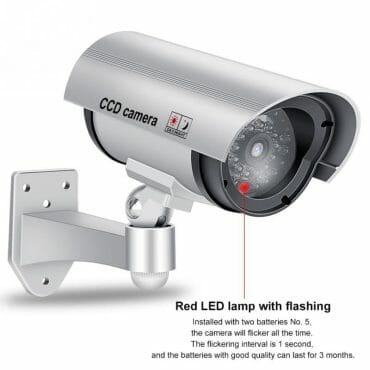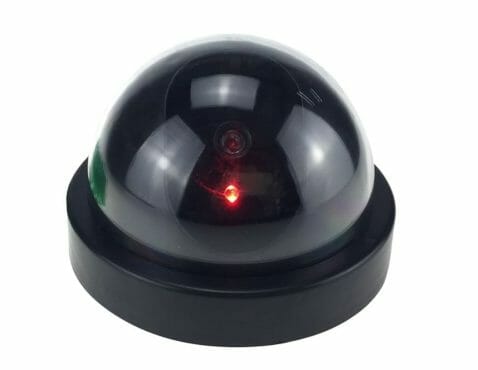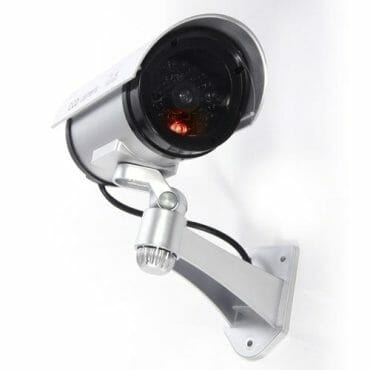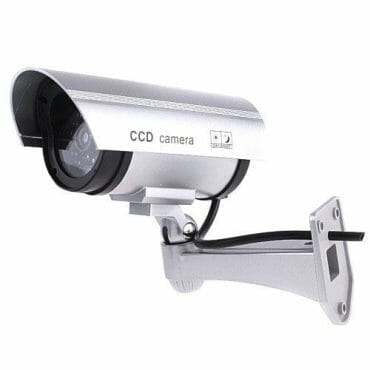As the demand for home security systems increases, so does the prevalence of fake security cameras. These fake cameras, also known as dummy cameras, are designed to look like real security cameras, but they do not actually record footage or deter potential intruders.
In this blog post, we will discuss some of the ways you can spot a fake security camera and avoid being fooled by these products.
Does the Presence of Security Cameras Matter?

According to ResearchGate data that surveyed 422 randomly selected incarcerated male and female burglars, one important step people can take to keep their property safe is a security system, including outdoor security cameras. When those surveyed were asked what deterred them from targeting specific locations, the presence of a security system was noted as one important reason they would seek an alternative target.
In other words, they wouldn’t even attempt to steal from properties with high-level security systems. The reason is obvious because security cameras can instantly capture a thief’s image, making it much easier for law enforcement to find and arrest the perpetrator for the crime.
Of course, this fact has led many homeowners and business owners to install dummy security cameras to trick burglars by creating the illusion of a security system.
Let’s review what it takes to spot or identify a fake security camera. Read on to learn more:
Six Ways to Identify Fake Security Cameras
Six primary ways to properly identify fake security cameras or dummy CCTV cameras exist.
1. LED Lights: Do Real Security Cameras Have a Blinking Light?

One dead giveaway for a security camera isn’t what it seems is LED lights. A real camera will have night vision. This means a red LED will be present when ambient light is not ideal. Fake cameras won’t blink when it gets dark. Some dummy or fake CCTV cameras come equipped with flashing LED lights designed to mimic a real camera.
However, most criminals can tell the difference between LED lights that come on only when necessary for video purposes and those that stay on all the time because they are battery-operated and are designed to mimic the real thing. If a LED light is flashing during the daytime, this is a sure giveaway to experienced criminals that you have a dummy camera. Also, the LED light isn’t overpowering or flashy on real cameras. In dummy surveillance cameras, it can be overpowering and obvious.
2. Cheap Materials
In many cases, a fake or dummy CCTV camera looks cheap. Instead of having a standard waterproof aluminum cover, a fake camera will have one made of cheap plastic. Most experienced criminals can easily recognize the difference between plastic and high-quality metal. This is especially true if you install your fake camera in an easy-to-reach location, like the front door.
3. Installation or Dummy Security Cameras Locations

Where people place a fake or dummy camera can make it obvious to a thief if it’s the real deal or a knockoff. An outdoor camera undergoes exposure to wind, water, and other aspects of being outside. A fake camera made of inferior material cannot withstand the elements for very long without breaking down or showing excessive signs of wear. This means it must be installed in a somewhat protective location, such as under ceilings or eaves.
Conversely, real cameras like ours are made of high-quality materials. They are designed to withstand all that Mother Nature can throw at them so that they can be installed anywhere, even outdoors, unprotected. Therefore, it’s safe to assume that a camera installed outdoors without protection from weather elements is likely real.
4. Wires
The presence of wires isn’t in and of itself an indicator of whether a camera is fake. After all, many cameras have built-in wires, and dome cameras are wire-free, which means there aren’t visible wires. Many fake cameras try to mimic the look of real cameras by adding fake wiring that sticks out.
This can fool some criminals, but many will recognize it as another way to copy the real deal. Therefore, in many instances, the presence of wires that are made to look real, in actuality, make it obvious a camera isn’t real at all.
5. Movement and Tracking

There are motion-sensing cameras today that sense motion and then record movements. However, they do not move or swivel when someone comes near. Conversely, some fake security cameras will rotate back and forth to mimic the motion-sensing element of the real deal. Keep in mind a real motion-sensing camera will usually never swivel. Instead, it will just begin recording the moment the sensor is activated.
It will record everything but not move. A fake CCTV camera will sometimes make significant movements. As of right now, accurate movement tracking isn’t always an affordable option for most security cameras, so it’s not a common feature or even a possible one for most units. Therefore, if you see a camera moving, it’s likely a dummy security camera or a fake camera.
6. Markings or Branding
One of the easiest ways to spot a dummy camera is the lack of branding on the outside. A real security camera will feature obvious brand markings identifying it as a legitimate system. A quick internet search of a particular brand will easily reveal whether it’s real or fake.
That means dummy cameras with branding can still be identified as dummy cameras. Therefore, simply noting branding does not mean it’s real. It has to be a brand synonymous with real security cameras to denote a real camera. Real security cameras will have lots of branding displayed in a prominent location. Fake cameras won’t always involve this attention to detail.
FAQs About Security Cameras You Will Want to Know
How Can You Tell If a Security Camera Is On?
You want to ensure your security camera is working properly, recording, and on when installed. How to check this will depend on the type of camera installed. If you have an IP security camera with infrared blinking red lights, you should see a small red blinking light around the camera lens.
You can also log into your security software, which is connected to your security system. This will show you live-stream footage if the cameras are working properly. Also, there are usually power indicators on security cameras that will make it obvious if the cameras are on and working. Sometimes these are a red light or blinking red light.
Are Dummy Cameras Illegal?
In short, no. At least in most cases, fake security cameras are not illegal. However, like real security cameras, dummy CCTV systems or fake security cameras must adhere to various laws. For example, all cameras, fake or not, must be carefully installed to avoid potential legal ramifications. Any cameras, even dummy varieties, aimed at a window or set to overlook private property can cause legal issues. In addition, there are legal ramifications in some form relating to fake cameras if people depend on them for security purposes.
For example, let’s assume a condominium property owner installed several security cameras — some real and some fake security cameras. Suppose people depend on each camera to provide the same level of security but later find out one camera is only a dummy. In that case, this could cause legal issues due to creating a false sense of security. An example of this could be a landlord providing a false sense of security by placing fake security cameras in a known dangerous area.
Tenants might be inclined to go to this location, thinking security systems protect them. If the cameras included a dummy security camera, tenants weren’t aware that the cameras weren’t real. Then they experienced harm in that location; the property owners could face legal ramifications, according to New York licensed lawyer Ken Kirschenbaum.
Wrapping Up
To learn how to fool a would-be criminal with a fake camera, it’s important to learn and understand the characteristics of the real thing. Experienced criminals will often notice even the smallest nuances of your security system, making it much more important that you expertly camouflage your dummy system.
If you do opt for a fake security system or one that at least utilizes a few fake cameras, understand you can’t rely on it for evidence of crimes committed or to alert you in a potentially threatening event or burglary. If you go about it with that mindset, you can successfully utilize inauthentic cameras to trick would-be burglars and discourage unlawful behavior on your property.

